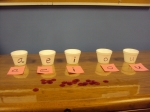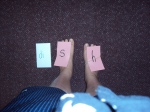The Basics
1 cup per sound. Tutor reads/says a word. Student repeats and places a token into the cup for the correct sound heard in the word (beginning consonant, short vowel, digraph, long vowel…..).
Basic Example: Short Vowels
Discriminating among short vowel sounds. The word is read. Student repeats and places a Bingo chip into the correct cup.
Label the cups either by placing sound cards in front, with a sticker or with a marker.
For a little extension, you can use lower case cards and upper case on the cups:
For some summer fun, use buckets and toss bean bags:
A Little Extra
As readers develop, continuing to isolate sounds in a word can be much more challenging that it seems. Good readers start to blend sounds quickly and isolate sounds only when spelling. Short vowels often sound quite similar and isolating sounds can become tricky because many readers will picture the word in their minds.
Which short vowel do you hear in the word “read”? (Yesterday, I read that book.)
- You see the vowels e and a. You hear the short e sound.
- You see the vowel y. You hear the short i sound.
Other Examples
Watch for things while taking a walk around the yard, the neighborhood, local gardens or even the zoo. What short vowels do you hear as you name things?
Use images from magazines or leftover pictures and keep in a bag. Go through them and see if you can find words with short vowels sounds (or whichever focus sound you are using).
Organize pictures by sound. Do you see a bat? ….. an apple? ……Uncle Oscar? ….. a puppy? …. a twig? Which sound “wins” today?!
** You are also expanding vocabulary and supporting creative thinking. Think of that twig. Is it a twig, or could it be a branch, or a stick? ……..
For stronger readers: use words with more than one syllables. ** Be sure to specify the listening target for each level or word.
- Which short vowel do you hear first?
- Which short vowel do you heard in the second syllable?
- Which short vowel do you hear? Give words with VC/V or other combined sound patterns, and stress which short vowel sound. (word examples: banjo, undo, plantation, sever, fondue, igloo).
One more note – this can be much harder than it seems so playing as a game will definitely ease any stress on the child (and the parent).
Brain Powers Activated
- Phonological Awareness
- Memory
- Attention to detail
- Auditory Processing
- (vocabulary)
- (flexible thinking)











